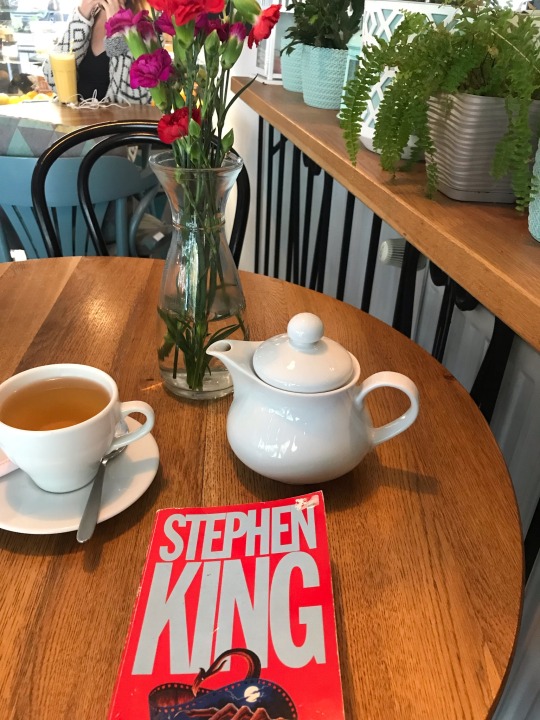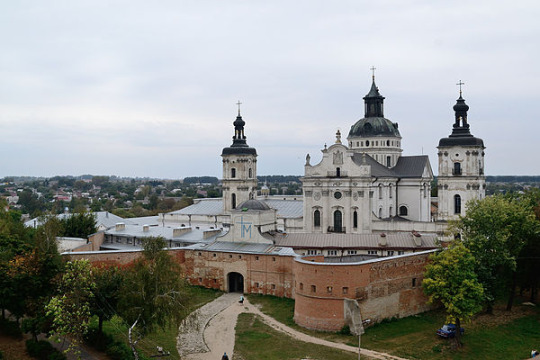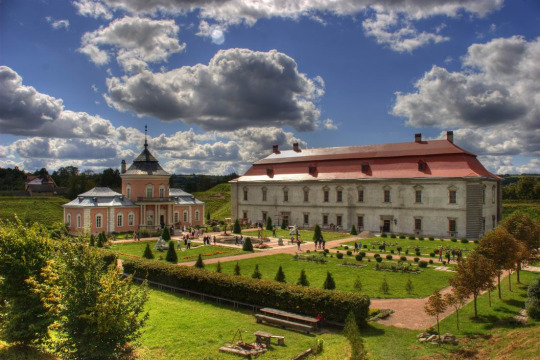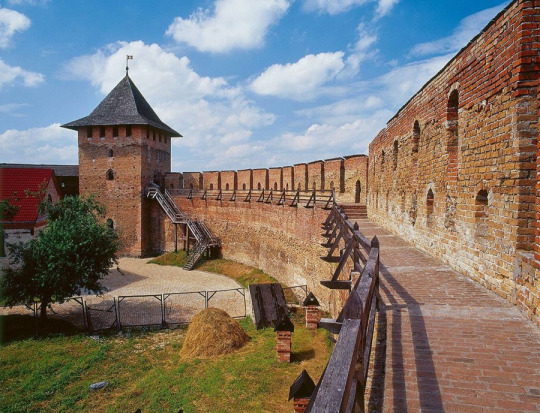#slavic langblr
Text
USA 🇺🇸 vs. Poland 🇵🇱
Winnie the Pooh 🍯
#winnie the pooh#polish langblr#polish language#video#po polsku#usa#poland#polska#funny video#langblr#polishcore#polish memes#slavic languages#slavic langblr#funny#language learning#language lessons#polish#śmieszne#zabawne#lol#*
98 notes
·
View notes
Text
My translation of the Article 1 of Universal Declaration of Human Rights into Polabian language (wenska rec):
Wiswibåcna Deklaracîja Clåwàcenych Prow
Artikål 1
Wisî ljûdi rudą sa wilni ún sibe likeni cu du dustujnusti ún sujych prow. Są winî wibdoreni wåzwîmåm ún såwedumåm a moją pustǫpuwat samét wå ťabé brotyrstwo.
All human beings are born free and equal in dignity and rights. They are endowed with reason and conscience and should act towards one another in a spirit of brotherhood.
IPA:
/viswibɒt͡snɐ dɛklarat͡sajɐ t͡slɒvɐt͡sɛnəx prɔv/
/artikɒl parə/
/wisai̯ lʲau̯di rydã sɐ vilnə un sibə likɛnə cu du dystyjnysti un syjəx prɔv/ . /sã vinai̯ vibdɔrɛnə vɒzvai̯mɒm un sɒvɛdymɒm ɐ mɔjã pystõpyvɐt samɛt vɒ tʲabɛ brotərstvo/
3 notes
·
View notes
Text
Funniest thing about the "chai tea" meaning "tea tea" to me is that I'm Czech and the Czech word for tea is "čaj" which is pronounced "chai" and you know what we actually - no joke - call chai tea?
"chai čaj"
We literally call it chai chai we DO call it tea tea we literally pronounce it chai chai it's a thing
#atsv#spiderman across the spiderverse#across the spiderverse#spider man across the spider verse#chai tea#spider man india#pavitr prabhakar#atsv pavitr#slavic#czech#linguistics#languages#langblr
6K notes
·
View notes
Text
The directional "下/上/出/去/来" puzzle guide
I for one still confuse the usage of 出来 and 出去 and other similar structures so here's a guide to slightly depuzzle this puzzle.
上去 (Shàngqù): To go up and away from the speaker
下去 (Xiàqù): To go down and away from the speaker
出去 (Chūqù): To go out and away from the speaker
出来 (Chūlái): To go out and towards the speaker
上来 (Shànglái): To go up and towards the speaker
下来 (Xiàlái): To go down and towards the speaker
过来 (Guòlái): To ask someone to come over to the speaker
过去 (Guòqù): This one is tricky as it can have a few meanings so here are some random examples.
Movement away from the speaker e.g. 我来这家公司工作已经过去五年了= I have been working in this company for the past five years
Movement in time during the past e.g. 过去的年份里,公园里有很多树和花= In the past years, there were many trees and flowers in the park
Here's an illustration I made (it's been a while lol) to make it less (?) confusing:

#chinese#chinese grammar#mandarin langblr#chinese studyblr#learn chinese#studyblr#college#slavic roots western mind#student life#aesthetic#travel blog#study motivation#student#college life#study blog#langblr#language#linguistics
180 notes
·
View notes
Text
Free online courses about Ukraine
Basics of the Ukrainian Language and Culture - https://www.open.edu/openlearn/languages/introduction-ukrainian-language-and-culture/
Ukraine: History, Culture, and Identities; this course is available in English, French, Italian, and Norwegian on Coursera: https://ui.org.ua/en/sectors-en/the-first-online-course-about-ukraine-in-english/
The Making of Modern Ukraine with Timothy Snyder: https://www.coursera.org/learn/the-making-of-modern-ukraine
Crimea: History and People on Udemy: https://www.udemy.com/course/crimea-history-and-people/

#ukrainian language#ukrainian#ukrainian101#ukrainian lesson#learning languages#language learning#ua lang#ukraine#langblr#slavic languages#learnsomethingneweveryday#learning#self studying#polyglot#Language blog#foreign languages#learnukrainian#learn ukrainian#free resources for language learners#free courses#language courses#slavic language courses#eastern european languages#eastern european#Ukraine
270 notes
·
View notes
Text
Najlěpša čast postovanja na medžuslovjanskom jest že jego ne znaje google translate. Zato ne možut zapadniki/amerikanci dati prěvoditi posty i potom iměti o njih durne hot takes
343 notes
·
View notes
Text
pls choose the best option & elaborate in tags if you'd like.
some endings are cut off to meet poll limits...
Context below the cut, but please answer first :)
this is the opening sentence of a letter written by fryderyk chopin to his friend and/or boyfriend tytus woyciechowski in 1829. he's 19/20 years old (we're not sure about his DOB), and he's been spending some time with prince antoni radziwiłł and his family at their palace in antonin (near Poznań). radziwiłł is a huge music nerd, and chopin is having a great time over there. the mood of the letter is mostly positive and upbeat, and you can probably expect him to be at his cheekiest.
there are 3 published english translations of this letter. none of the 3 translators are native polish speakers. here are their takes on this sentence:
full original sentence from chopin's november 14 1829 letter:
Ostatni twój list, w którym mi każesz się ucałować, odebrałem w Antoninie u Radziwiłła.
EL Voynich, Chopin's Letters (1931), pg 73:
I received your last letter, in which you send me a kiss, at Antonin, at the Radziwiłłs'.
Arthur Hedley, Selected Correspondence of Fryderyk Chopin (1962), pg 36:
Your last letter, in which you send me your warmest greetings, reached me at Radziwill's place at Antonin.
David Frick, Chopin's Polish Letters (2016), pg. 143:
I received your last letter, in which you tell me to give myself a kiss, in Antonin at Radziwiłł's.
why is this important?
1) it's an interesting grammar problem where the combination of a referred statement (FC is summarizing what TW said), a command, and a reflexive (się) makes it unclear who is to kiss who.
2) we don't have any letters from TW to FC, so it's useful to piece together the way he may have written to him.
3) FC has a habit of teasing TW for not liking to be kissed, which historians have taken a bit too seriously, if you ask me.
4) we'll talk about arthur hedley some other time, but yeah... i know.
i read this letter in polish first, and i didn't realize this sentence might be ambiguous. when i started reading the translations, i was surprised to see the different takes. my reactions ranged from "?" to "????" i like remind myself that my perspective is also biased, though -- by the fact i speak modern polish, and this is a 200 year old letter. i think this is a good example of how subjective translations can be. you ask 4 different people to translate something, you might very well get 4 different translations.
82 notes
·
View notes
Text

Revised language learning plan for the rest of the year
#langblr#It's just a draft#I think I'll stick with Croatian for my EU language for now?#But I might do some taster sessions in some other languages to see how I vibe#Croatian just makes sense because of its mutual intelligibility with other slavic languages that might join the EU soon#But Greek and Hungarian are more urgently needed#There's also the option to learn Albanian or Georgian in the hope they make progress in the EU application#Turkish is pretty much frozen in negotiations but hnnnnng cool language
58 notes
·
View notes
Text
so I'm trying to add new vocabulary to my Anki but I keep getting DISTRACTED by every Czech word I can't logically derive from my existing knowledge of Slavic languages and this is how I ended up here:
wonder why "art" is called "umění" in Czech - sounds familiar but huh
ohh yeah уметь -> umět haha
wait what's art got to do with "can"/"to be able". I guess you can do art... ok moving on
write down the german translation for "art" in Anki
"Kunst" ..................................................... hold on a sec. "können"?????
:

7. mind = blown
#. the wiktionary adventures continue shkdjfshd#. the czech word is ultimately from proto slavic *ũmъ (mind)#. idk man i love that#čumblr#langblr#etymology#german#czech#r.wiki
32 notes
·
View notes
Text

World Map 500CE
The Great Migration Project (TGMP)
My linguistic project may have turned into a full-blown worldbuilding project that I am collaborating with my dear friend Aurora. She and I have decided to make two changes to the world.
Firstly, the Germanic tribe in southern Finland has mixed with the finnish culture, leading to a Finno-Germanic culture in the area (creating the Sweans)
Secondly, Aurora has created a Judeo-Slavic culture in Crimea (Yán-Máyim) to tell her aspect of the story of the Jewish during the diaspora (She's Jewish, btw, so pls do not murder us... wait, this is Tumblr, not TikTok/Reddit :D)
I'll share more as we continue to work on the project :)
#linguistics#conlang#historical linguistics#worldbuilding#conlanging#langblr#alternative#alternate history#finnish#proto germanic#germanic#germanic languages#jewish#slavic
15 notes
·
View notes
Text
So my thesis is on Slavic-Romanian-Hungarian etymological connections and so far I have quite a good amount of Romanian sources, the Hungarian ones are pretty promising too, but I can't for the life of me find any Russian books on the topic 😭
If anyone happens to know texts in Russian that work with vocab of Slavic origin in eastern and middle European languages, I'd be so so happy to receive some recommendations! Please and thank you :')
#it could also be just generally about general phonetics development of Slavic words over time!#can also be English but I need Russian sources the most#studyblr#langblr#русский язык#russian langblr#today on: will I finish this thesis or will it finish me#shrews post
5 notes
·
View notes
Text




Feeling very what the hell am I doing right now, studying abroad in a beautiful city with so many wonderful people but feeling well and truly overwhelmed. Does anyone have tips for studying abroad in a foreign language? 😅
11 notes
·
View notes
Text
I find it funny how English speaking people use he/she pronouns for objects/animals as a way of showing endearment when there's multiple languages - including mine - that just gender objects and animal species in general
Table? Guy shaped.
Shoe? Girl shaped.
Door? They/them that bitch.
Cat? Girl until proven otherwise.
Dog? Boy until proven otherwise.
Pig? Let's not even bother, it's an it/its.
And that's just Czech. German has completely different genders for most of these things. And that goes for every other heavily gendered language. It's a curse really :)
#language#languages#langblr#czech#slavic#german#der die das babey#dem die den and so on#and then die is der sometimes#forgot when#I don't understand how the hell the gendering in MY language works how am i supposed to understand it in another language#and then there's the english speakers going 'look at that rock look at him' and you're like yeah that sure is der Rock#(disclaimer der Rock is actually 'skirt' in german...yes it's masculine...german said men in skirts rock ig)#i don't think rock is masculine in german is it? stein? is stein a rock or is that more like mountain?#a rock IS masculine in czech#looked it up and yes der Stein is masculine and it does mean rock#i would've sworn it was das Stein but then again I wasn't the best student
219 notes
·
View notes
Text
The 然's
突然,虽然,忽然. and the other 然's can often get mixed up, so here's a quick explanation of some of the most common ones!
突然 (Túrán): This means suddenly or unexpectedly
居然 (Jūrán): This kind of means suddenly, but more in the sense of "surprisingly" or to suggest disbelief at something that happened.
忽然 (Hūrán): This also means suddenly or unexpectedly, but it has a more stronger connotation.
既然 (Jìrán): This is a conjunction meaning "since" or "now that"
既然the weather is great, let's go out!
既然 you aren't busy, let's go watch a movie.
不然 (Bùrán): This means "otherwise" or "or else";
You should study, 不然 you won't do well on the exam.
虽然 (Suīrán): This means although or even though.
虽然 I'm not good at singing, I still like to go to the karaoke.
当然 (Dāngrán): 当然 means certainly or definitely and can be used as a reply:
Can you help me with A? 当然!
自然 (Zìrán): This can mean nature or naturally.
China's 自然 is very beautiful.
She speaks Chinese 得很自然.
仍然 (Réngrán): This can mean "still" or "yet".
I仍然 haven't read that book.
依然 (Yīrán): Similar to 仍然, this also means still" or "yet" but it's usually used in more formal and literary works, whereas 仍然 is more often used in spoken language.
果然 (Guǒrán): 果然 can be used to mean "indeed" or "as expected"
This movie is 果然 interesting.
竟然 (Jìngrán): This is an adverb used to suggest surprise or something unexpected.
He竟然forgot her birthday.
显然 (Xiǎnrán): This means "clearly" or "obviously".
This soup 显然 hot.
偶然 (Ǒurán): This means "accidentally" or "by chance".
We 偶然 met at the same cafe.
How many other 然's do you know about? Drop a comment!
#slavic roots western mind#student life#student#study blog#college#college life#travel blog#aesthetic#studyblr#study motivation#chinese#china#study in china#life in china#learn chinese#chinese grammar#grammar#vocabulary#chinese vocabulary#chinese verbs#verbs#verb#chinese studyblr#mandarin langblr#mandarin#mandarin chinese#chinese language#language learning#chinese langblr#language resources
73 notes
·
View notes
Text
Castles of Ukraine

Бердичівський замок

Дубенський замок

Золочівський замок

Замок Любарта
Vocabulary:
Замок - zamok - castle
Королівський замок - koroleevskyi zamok - royal castle
Королівська сім'я - koroleevska seemia - royal family
Принц - prynts - prince
Принцеса - pryntsessa - princess
Король - korol - king
Королева - koroleva - queen
#ukrainian language#ukrainian#ukrainian101#ukrainian lesson#learning languages#language learning#ua lang#ukraine#langblr#slavic languages#learnsomethingneweveryday#learning#self studying#polyglot#Language blog#foreign languages#learnukrainian#learn ukrainian#ukrainian culture#Ukrainian castles#royal vocabulary
59 notes
·
View notes
Text
I just love how PL ó, CZ ů, and SK ô developed from the exact same phoneme [o:], at around the same time and in almost the exact same way (becoming [uo] for some time) but they're still somehow used completely differently. What the hell
122 notes
·
View notes